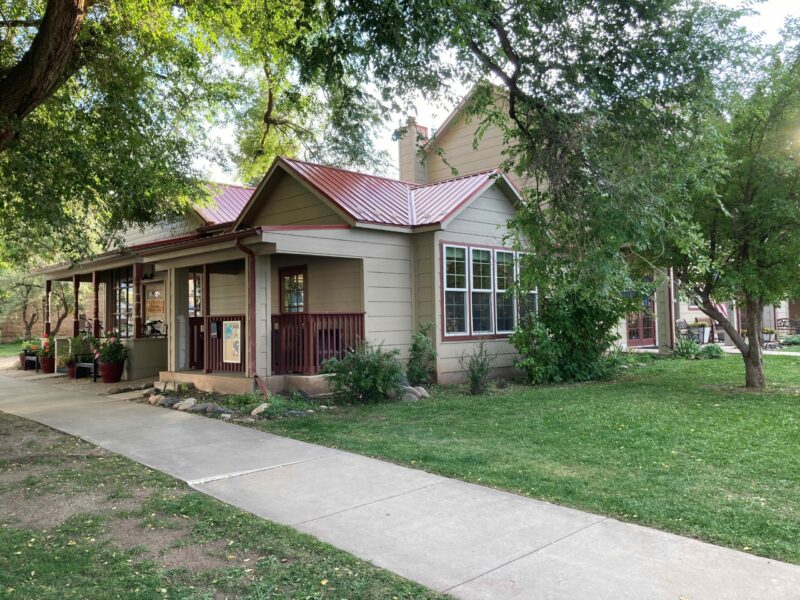
Now emission-free, the La Veta Public Library features new high-efficiency air handlers; low ambient temperature heat pumps; two electric thermal storage (ETS) heaters; electric strip heaters as a back-up heat source in case of an emergency; new thermostats; an additional 16 inches of blown-in attic insulation, as well as upgraded insulation in the crawl space, walks and rim joists; an upgraded electric panel to accommodate a higher electric load; and an 84-inch Hunter TRAK high-volume, low-speed fan.
More and more of our energy is coming from the electric socket. The shift is growing with the adoption of electric vehicles, high-efficiency HVAC systems, and new water-heating technology, among other things. There are many motives for fuel-switching, from personal preferences to practical ones. Many tout air quality benefits in switching to electric heating and cooling technologies. Additionally, electricity costs are more stable and often lower than those of propane and, at times, natural gas costs. Recognizing these advantages, the government has also introduced tax incentives to encourage the conversion from gas to electric for both residential and business purposes.
While there are tax incentives and rebates available to ease the financial burden, the cost of converting to electric can still be steep. Nevertheless, in cases of new construction or when existing appliances are approaching the end of their usable life, transitioning to an all-electric setup can be cost-effective, especially if existing ductwork can be retained.
Take, for example, the La Veta Public Library. When the aging air conditioning and heating units failed, library leadership staff turned to San Isabel Electric for assistance. SIEA’s Energy Services team conducted a thorough evaluation of the facility and informed the library about an available grant that covered 50% of the project costs.
Environmental benefits of zero emissions is part of the library’s long-term strategy, but the decision to switch from propane to an all-electric system was primarily driven by practical considerations. Its HVAC system had stopped working, and another significant factor was the inability to host a propane tank on library property. This issue became more pressing when the property hosting their tank went up for sale, leaving the library uncertain about the tank’s future availability.
Library Director Tony Masinton contacted SIEA when the library’s heating and cooling system failed. There were no other qualified commercial contractors available to handle the project’s scope. “You were our first and only option,” Masinton explained, underscoring why he sought advice from the electric cooperative.
Although the library received a competitive bid from a contractor in Colorado Springs, the proposal didn’t adequately meet the building’s electrical requirements and would have encroached on valuable library space needed for shelving and public use.
Through SIEA’s Empower program, the library was able to utilize and repair existing ductwork, ensuring a seamless project that didn’t disrupt library operations or services. SIEA’s Energy Services staff also handled all the paperwork for eligible rebates, incorporating the rebate savings directly into the project.
Masinton commended the experience, saying, “It was a really pleasant experience. Jack [Snell, SIEA Energy Services Manager] was really good at finding and coordinating contractors. He did an excellent job of keeping us informed during delays caused by remote work and supply chain issues. He even made personal visits to ensure things were on track.”
The core of the La Veta Library’s building was built in the 1870s. Since then, it has been physically moved to different locations in town three times. Today, the building is protected by historical preservation laws and part of the La Veta Historic District.
This HVAC project is an excellent example of how historic buildings, even ones protected by preservation laws, can be successfully and sympathetically adapted to take advantage of “green” or “zero emission” energy technologies, thereby extending their lives and helping them to continue contributing to their communities, Masinton also noted.
The Energy Services team projected the library will see energy bill savings in the first few years, and a full return on their investment after 10 years. The library is especially thankful that half of the project was paid for by a grant from the Colorado Department of Local Affairs.
SIEA’s Empower program offers energy efficiency guidance, products, services, and financing to underserved areas in southern Colorado. Whether your project is large or small, with a budget of $500 or $50,000, or even if you just need an energy assessment for your home or business to save on energy bills, our team is here to assist you. Don’t hesitate to reach out — let’s start a conversation.
Visit siea.com/Empower, call 800-279-SIEA (7432) or email energyservices@siea.com.

Recent Comments